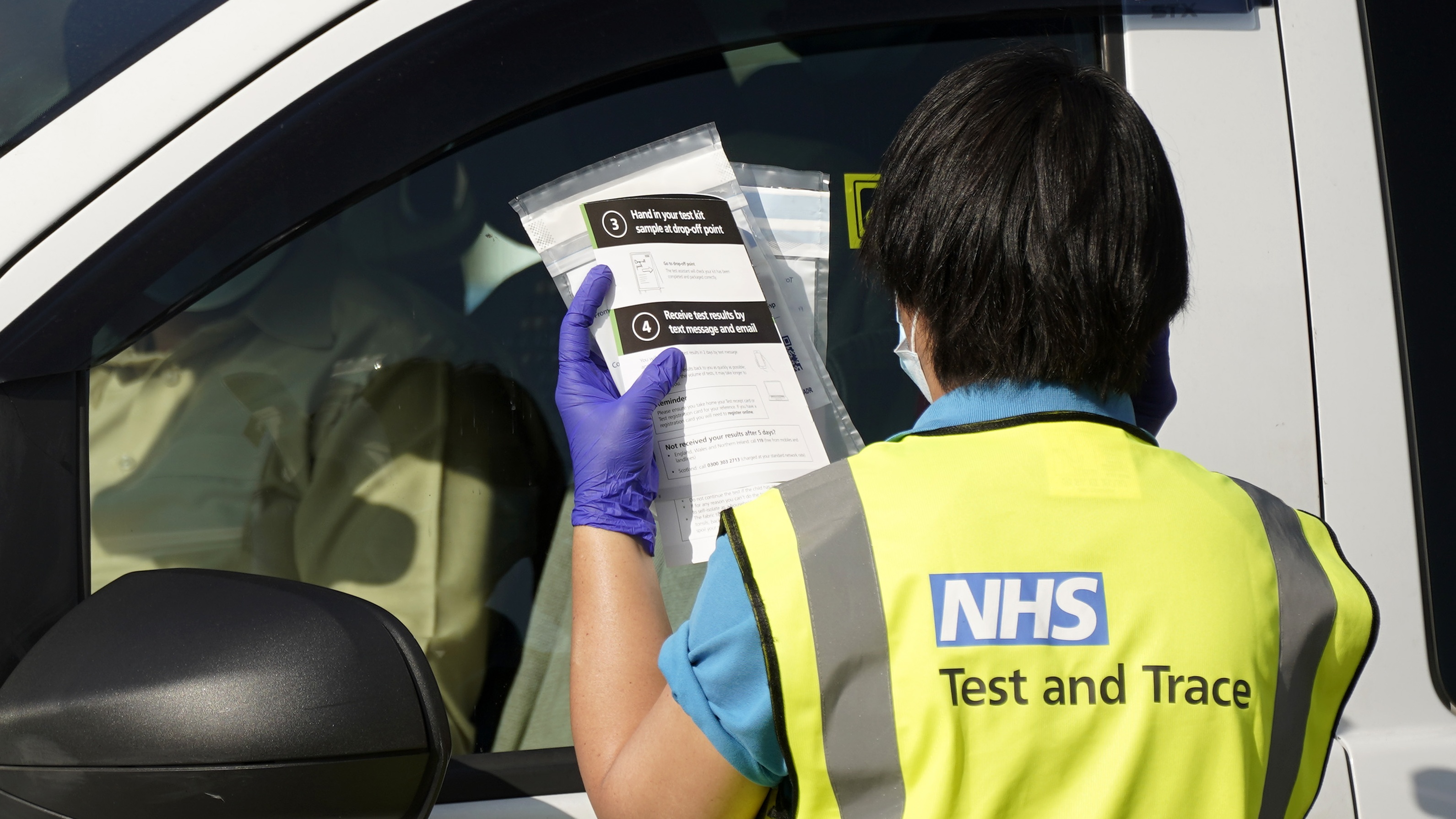The government’s plan for stemming spread of the India coronavirus variant
Vaccinations could be brought forward to halt more infectious strain

A free daily email with the biggest news stories of the day – and the best features from TheWeek.com
You are now subscribed
Your newsletter sign-up was successful
Ten million people could have their second vaccination doses brought forward as part of a government plan to stop the spread of the India Covid variant.
A rapid response surge team has been deployed to Bolton to ramp up testing in the area, with the Department of Health last night saying that the more infectious strain is “beginning to spread increasingly rapidly in certain areas of the country,” says Politico’s London Playbook.
“Cases of the variant have more than doubled in a week,” The Times reports, with Vaccines Minister Nadhim Zahawi telling Times Radio that people in affected areas may have their second jab brought forward to counter the strain, saying: “We will flex the vaccination programme according to clinical advice.”
The Week
Escape your echo chamber. Get the facts behind the news, plus analysis from multiple perspectives.

Sign up for The Week's Free Newsletters
From our morning news briefing to a weekly Good News Newsletter, get the best of The Week delivered directly to your inbox.
From our morning news briefing to a weekly Good News Newsletter, get the best of The Week delivered directly to your inbox.
Variant of concern
Latest figures show that cases of the India variant have doubled since 5 May, when Public Health England registered 520 cases of the strain that has pushed India’s healthcare system beyond breaking point.
The team sent to aid council workers in Bolton includes “100 nurses, public health advisers and environmental health officers”, Politico reports, with the “immediate focus” on going “door to door, encouraging residents to take a PCR test”.
However, while “ramping up testing” is priority number one, “ministers appear to be very much open to the possibility of redeploying the vaccine rollout” if it could help suppress the new threat, the site adds.
A free daily email with the biggest news stories of the day – and the best features from TheWeek.com
“Extra supplies of vaccines are being sent to areas where the Indian variant is rising,” The i reports, with “about 3,500 extra doses” of the Pfizer vaccine to be made available in Blackburn with Darwen, which currently has the third highest Covid rate in the country.
Bolton is also being targeted with a “vaccine bus to offer residents in the community greater access to the jabs”, while other measures to control the spread, including “local lockdowns” and school closures, are also on the table, the paper adds.
Questions have been asked after Blackburn with Darwen “attempted to break rank with national guidance… saying it would offer vaccines to those aged 18 and over in three wards before later reversing its decision”, The Independent reports.
An NHS source told the paper that the council was not given permission to pursue the plan. However, extra clinics will be opened in the area as of next week “to make sure everyone who’s eligible is getting jabbed”, Politico says.
Two scientific advisers to the government told The Independent that targeted vaccinations could slow rising transmission rates and bring the situation under control.
“Overall this strategy makes sense,” Kamlesh Khunti, a professor of vascular medicine at Leicester University and Sage member, said. “There are areas we are already doing surge testing for, so it makes sense to introduce targeted vaccinations in these areas as they will have the highest risk of transmission.”
Susan Michie, a professor of health psychology at University College London and member of Sage’s sub-group on pandemic behaviour, added: “If you take it to people’s doors, into the street they live in, people who are a bit hesitant, if you make it easy, they may be more likely to accept the vaccine.
“[Surge vaccination] signals the importance of it. People will realise, if the messaging is right, that what this is about is stopping transmission from further increasing in a specific area.”
Lockdown timeline
While the government has been keen to maintain calm in relation to the spread of the India variant, Politico suggests that we should “brace for calls from scientists for the government to put the brakes on” plans to further relax lockdown restrictions.
Not only are some experts calling for a delay in England’s route out of lockdown, but Dominic Cummings has also been busy “retweeting posts by mathematicians and scientists warning against the latest stage of reopening”, the site adds.
Writing in The Times, science editor Tom Whipple says that “in some ways, the situation today is very similar to that in November, when the Kent variant changed the course of our and the world’s pandemic”.
However, he continues that “in crucial ways, though, it’s very different and a lot harder to interpret”, explaining that “this time, unlike in November, the general rate of infection is very low”.
Another key difference between now and November is vaccines, he adds, with “structural biologists and geneticists on the variant technical group cautiously [suggesting] this particular variant is unlikely to chip away much at our immunity”.
Joe Evans is the world news editor at TheWeek.co.uk. He joined the team in 2019 and held roles including deputy news editor and acting news editor before moving into his current position in early 2021. He is a regular panellist on The Week Unwrapped podcast, discussing politics and foreign affairs.
Before joining The Week, he worked as a freelance journalist covering the UK and Ireland for German newspapers and magazines. A series of features on Brexit and the Irish border got him nominated for the Hostwriter Prize in 2019. Prior to settling down in London, he lived and worked in Cambodia, where he ran communications for a non-governmental organisation and worked as a journalist covering Southeast Asia. He has a master’s degree in journalism from City, University of London, and before that studied English Literature at the University of Manchester.
-
 How the FCC’s ‘equal time’ rule works
How the FCC’s ‘equal time’ rule worksIn the Spotlight The law is at the heart of the Colbert-CBS conflict
-
 What is the endgame in the DHS shutdown?
What is the endgame in the DHS shutdown?Today’s Big Question Democrats want to rein in ICE’s immigration crackdown
-
 ‘Poor time management isn’t just an inconvenience’
‘Poor time management isn’t just an inconvenience’Instant Opinion Opinion, comment and editorials of the day
-
 A Nipah virus outbreak in India has brought back Covid-era surveillance
A Nipah virus outbreak in India has brought back Covid-era surveillanceUnder the radar The disease can spread through animals and humans
-
 Trump HHS slashes advised child vaccinations
Trump HHS slashes advised child vaccinationsSpeed Read In a widely condemned move, the CDC will now recommend that children get vaccinated against 11 communicable diseases, not 17
-
 A fentanyl vaccine may be on the horizon
A fentanyl vaccine may be on the horizonUnder the radar Taking a serious jab at the opioid epidemic
-
 Health: Will Kennedy dismantle U.S. immunization policy?
Health: Will Kennedy dismantle U.S. immunization policy?Feature ‘America’s vaccine playbook is being rewritten by people who don’t believe in them’
-
 How dangerous is the ‘K’ strain super-flu?
How dangerous is the ‘K’ strain super-flu?The Explainer Surge in cases of new variant H3N2 flu in UK and around the world
-
 How music can help recovery from surgery
How music can help recovery from surgeryUnder The Radar A ‘few gentle notes’ can make a difference to the body during medical procedures
-
 Vaccine critic quietly named CDC’s No. 2 official
Vaccine critic quietly named CDC’s No. 2 officialSpeed Read Dr. Ralph Abraham joins another prominent vaccine critic, HHS Secretary Robert F. Kennedy Jr.
-
 This flu season could be worse than usual
This flu season could be worse than usualIn the spotlight A new subvariant is infecting several countries